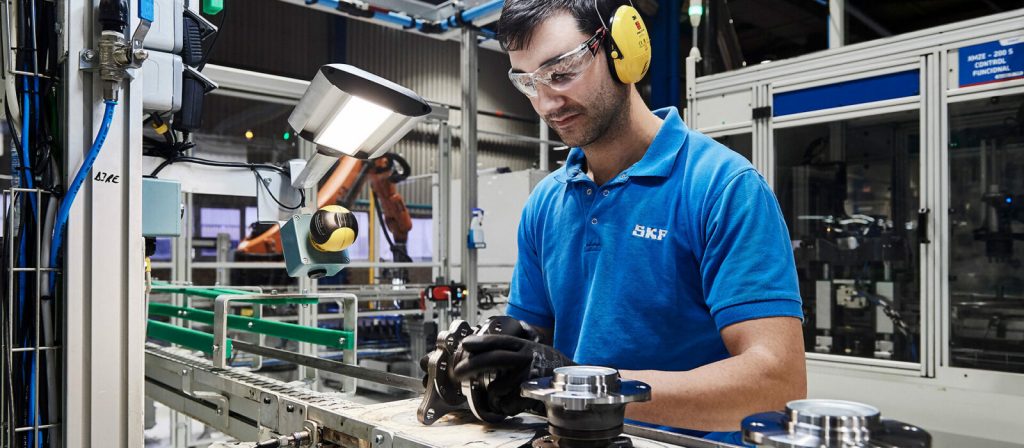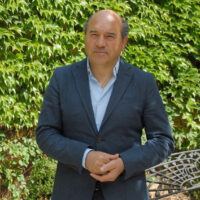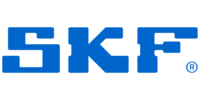
More than half a century ago, the Swedish multinational SFK wanted to expand its activities in Spain. They chose Tudela, in the south of Navarra for its strategic location, and in 1971 they began work on what would become one of the corporation’s most advanced production plants.
Since then, the factory has received several awards from the group, among them the best plant for four years. They have also been distinguished with innovation awards for some ideas that have come out of the Navarra plant, have been taken forward and are now standards for the group and even for customers.
Julián Jiménez, general manager of SKF Española, talks to us about the differential advantages of the automotive sector in Navarra and how the regional ecosystem helps companies to be more competitive.
In 1970, SFK wanted to expand its activities in Spain. Up to that time, the company had a plant in Eibar that did not offer conditions for growth and therefore the company looked for other areas in Spain. They chose the area of Tudela and subsequently acquired different plots in the area until they reached 300,000 square meters of surface area.
We do not have specific data because the decision was taken 55 years ago. But we do know that, at that time, Navarre was experiencing significant industrial growth and, in some way, the investments called for other investments in the area. And there is another factor that was decisive at that time and is also decisive today. Tudela is very well located, from a logistic point of view, with the north, the east, the south and the central area of Spain, a factor that was undoubtedly taken into account.
The products we manufacture or the product-portfolio, as we call it, is not something that has been formed all at once now, but has been evolving over the last decades. Every time the group assigned us a new project, we launched it and successfully supplied it to our customers, and that meant that new references were added to our portfolio.
The Tudela factory plays a very important role for SKF in terms of production volume and the products we develop. We are confident that we will continue to opt for new developments for the group.
The SKF Group’s opinion of the Tudela plant is very positive thanks to the good performance we have shown since the beginning. The factory has received several prizes from the group, including the Best Performing Plant award for four years. We have also been distinguished with innovation awards for ideas that have come out of here, have been taken forward and are now standards for the group and even for some of our customers.
This is also the result of the fact that we are very committed to what we do. We anticipate problems, we anticipate market demand and we are always on the front line, striving to be able to provide a great service to our customers.
All this has to go hand in hand with quality control in production and the search for cost competitiveness. This is basic to be able to supply the automotive industry, and it is something we have to take care of and know how to value at all times.
SKF Española’s head office is here in Tudela and we have been operating here for 50 years. I think this is a good demonstration that things are going well and that there is a good marriage between SKF and Navarra.
We should mention SKF’s 2020-2030 target, which aims for all group companies to be CO2 neutral. Our president committed to achieve this goal in all SKF production centers worldwide.
With that goal in mind, our factory started working some time ago and we have achieved CO2 neutrality since 2019. This is a great achievement thanks to the Tudela team, which has sought formulas to reduce energy consumption and thus reduce CO2 emissions and, in turn, make these processes that generate CO2 can be replaced by alternative ones. In 2019 we received an award for this, of which we are very proud.
But, in addition, SKF thinks that it is also one of its priorities to promote all those projects that can reduce the CO2 generated in the industry. In this sense, SKF discovered in Sweden a method for industrial oils to be treated in a process we call DST RecondOil. These oils can be used as many times as wanted, in a way that is, let’s say, infinite. This discovery has been incorporated in Tudela to offer the service to those external companies that want to implement a circular economy process. This will avoid the emission of thousands of tons of CO2 in the companies of our environment that want to participate in this dynamic.
Operating in an industrial environment and, within that environment, having automotive well-stablished activities, is crucial for us to progress and to do so at the speed that the market demands of us. It is not enough if we do things better today than we did ten years ago; we have to do them better than we did yesterday, given the speed at which we have to improve our activities.
Being in this environment, we can achieve synergies between the different companies, get to know each other better and, above all, work on the local to local concept. By local to local we mean that we should be able to manufacture in the region all those products that we need and that are consumed here. This would generate value in society, in Navarre and, in turn, would contribute to reduce our dependence on distant countries, given the logistical problems we have had and are experiencing and other potential difficulties that these long distances can cause.
The Regional Government first launched the Smart Specialization Strategy S3 and, in December last year, updated it to S4. In short, what this plan determines are six strategic initiatives in the Autonomous Community, which include, for example, healthy eating, people’s health care or the electric vehicle, to mention just three of them.
All these initiatives are, let’s say, transversally crossed by concepts of sustainability and digitalization. In other words, everything that is done within the framework of these initiatives must be based on improving the sustainability and promoting the digitalization of processes. From these actions emanate the investments that the Regional Government can allocate to companies such as ours.
In addition, the digitalization process makes use of companies and entities that operate in the community and are experts in the implementation of these systems. We have the University, the Navarre Industry Association (AIN), the European Business and Innovation Center of Navarre (CEIN), the Automotive Cluster of Navarre (ACAN)… A series of organizations ready to support companies.
In that sense, what we see is that all those initiatives that we companies have promoted individually to improve our competitiveness in terms of sustainability and digitalization are fully aligned with what the Foral Government is proposing to do. Therefore, we are working in the same direction.
The permanence of an industrial activity in a given environment depends on the companies that are operating there being able to achieve their objectives in that environment. Among other things, in that environment we have to be able to adequately train our personnel and look for companies that will collaborate with us in achieving our objectives.
In this regard, I would like to mention local companies. In Navarra we have truly exemplary examples. Our collaborating companies are not just because they are close to us, but because they are the best in the world at what they do. In our case, many of our Navarre collaborators are SKF suppliers worldwide and work for countries such as Germany or the United States from here, from Tudela, or from our surroundings.

Operating in an industrial environment and, within that environment, having automotive activities, is crucial for us to progress and to do so at the speed that the market demands of us. By being in this environment, we can achieve synergies between the different companies, get to know each other better and, above all, work on the local to local concept.
We do not choose our collaborating companies only because they are close to us, but because they are the best in the world at what they do. In our case, many of our collaborators in Navarra are SKF suppliers worldwide and supply countries such as Germany or the United States from here, from Tudela, or from our surroundings.

SKF Española is formed through the merger of four companies owned by the Instituto Nacional de Industria (INI), Banco Urquijo and the SKF Group.
On July 15, 1971, construction work began on the Tudela plant.
Since 1985 SKF Española has been 100% owned by the SKF Group.
Between 2018 and 2019, the SKF Group invested a total of €6 million to modernize the Tudela plant and equip it with new production channels to meet external demand.
In 2019 SKF Española achieved a turnover of approximately 214 million euros thanks to its more than 390 employees and a distribution network of more than a hundred points of sale throughout the country.